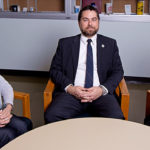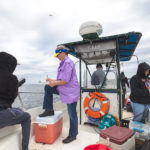Sustainability, Climate Change Focus of Professor’s Research
Dr. Haris Alibašić's award-winning research on sustainability and climate change has a two-fold approach.

Dr. Haris Alibašić’s award-winning research on sustainability and climate change has a two-fold approach.
“It was a combination of my work and academic pursuit – trying to apply research to my work and vice versa,” Alibašić said.
The field of sustainability seeks to avoid the depletion of natural resources in order to maintain the ecosystem and to address social issues.
Alibašić, an assistant professor in the public administration program at the University of West Florida, said the research also considers the nature of cause and effect.
[soliloquy id=”4585”]
“Another reason for being interested in sustainability and climate resilience was an idea that every action of an organization in either the private or public sector should be viewed long term,” he said. “Sustainability provides such a framework and furthermore looks at issues not just from the economic, but from the social, environmental and governance impact.”
Alibašić’s work was recently recognized by the West Michigan Sustainable Business Forum and previously from West Michigan Environmental Action Council and local university in Grand Rapids. Prior to joining the UWF, he directed energy, sustainability and legislative affairs policies and programs for the City of Grand Rapids, Michigan. During his tenure, the city won national sustainability and climate change awards, but he said his work in the field is ongoing. Recently, his research was recognized at an international conference on sustainability held in Rio, Brazil where he presented findings on the use of quadruple bottom line in local governments sustainability efforts.
“Being honored three times in Michigan for my sustainability and climate preparedness work does not make me think that I am done,” he said.
Earlier this year, Alibašić was appointed to the newly formed City of Pensacola Climate Mitigation and Adaptation Task Force.
“All the sustainability and climate change work in Pensacola is at the very early, nascent stage and a lot of work needs to be done to move this agenda forward,” he said. “There has to be a commitment from local governments and the private sector to support the work in the community.”
In the current national political climate, climate change can be a controversial subject, but Alibašić said that where government might step back, the private sector shows willingness to fill in funding gaps.
“Climate change research will be impacted as there will be no federal funding available to support such work,” he said. “However, because people care deeply about our shared environment, there are indications that private sectors and certain foundations are stepping up to support the research.”
Alibašić’s paper “A Nexus of Sustainability and Climate Resilience Planning: Embedding Climate Resilience at Local Government Level” has been accepted for presentation at the International Conference on Climate Change: Impacts and Responses to be held this month in the United Kingdom. The paper focuses on climate change and sustainability planning efforts at local governments’ level.
“Internationally, the U.S. must play a much bigger role in providing leadership to reduce greenhouse gas emissions and to get other countries to follow,” he said. “However, in the past, whenever there was no federal government leadership on either sustainability or climate change, local governments played a more prominent role in committing to reduce the impacts of climate change.”
Alibašić will also be taking a group of interdepartmental students to the state-wide competition on municipal services modernization in May in Orlando.
“The MuniMod competition is organized by the Florida League of Cities, where I serve on their research partnership for local governments team,” he said. “Four UWF students will compete against students from other universities around the state and be tasked to develop a technical solution to an ongoing municipal service issue or problem. This is the first time that UWF will participate in this competition.”
As his research continues, Alibašić said that it’s important to not lose sight of how big an issue sustainability and climate change is and will be.
“It’s important to remember that leaving politics aside, this is one of the intergenerational issues that will define the future,” he said. “After all, we have a responsibility and duty to our kids and future generations to leave this planet a better place to live.”



